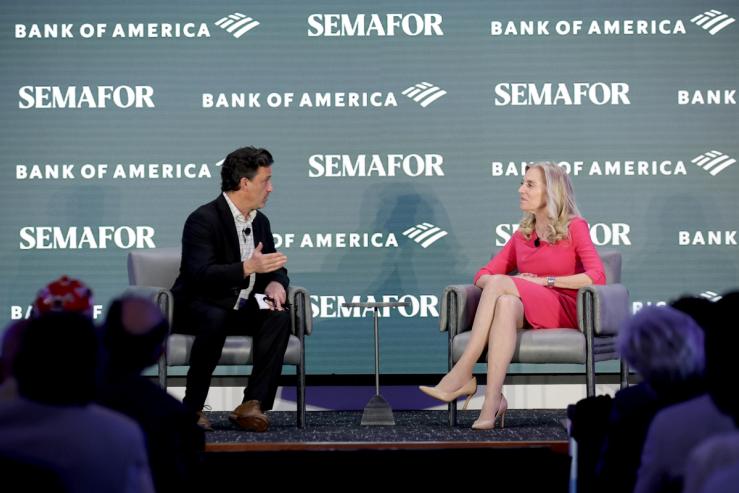The Scene
Semafor’s World Economy Summit Fall kicked off in Washington DC Thursday, with political leaders and industry power players discussing the biggest issues in global finance and the future of technology, including AI, green energy, and navigating geopolitical headwinds.
Semafor’s journalists and contributors were in conversation with newsmakers, including Sergio P. Ermotti, the Group CEO of UBS, White House National Economic Council Director Lael Brainard, and April Miller Boise, the executive vice president and chief legal officer at Intel.
Global Finance Views
Bernard Mensah
On China’s economy: Mensah stressed that China’s place in the world economy is both significant and interlinked to the health of other countries’ economies. That said, he believes that Beijing’s recently announced stimulus package may be insufficient: “The conventional wisdom is that it probably isn’t enough.”
“The bigger issue,” for China, he said, “is that the growth model was an export model, which continues to be the case. And my sense is that China is constantly working with how to shift this model,” but significant challenges remain.
On Europe’s evolving role in the global economy: Mensah said that European economies need to address the lack of growth on the continent with urgency and immediately, yet both are somewhat lacking: “If [Europe] plays its part, I think that would just ease some of the global tensions… There should be a lot more urgency.” A potential way forward, Mensah said, would be to “not lead as much with the stick, more with the carrot, with respect to regulation.”
Part of the challenge may be in how European lawmakers see balancing economic growth with a very strong social safety net for their populations. “Any of us would know what needs to be done, but the question is whether there is the political will.”
Sergio P. Ermotti
On Europe’s sluggish growth: Sergio P. Ermotti stressed the fragmentation of Europe’s economy as a challenge to the region’s growth: “You have 27 countries, each of them has their own priority and agenda, and it’s quite difficult to get all of them to align on major projects nowadays.”
Ermotti stressed the bloc’s need to shift away from economies built overwhelmingly around strong social safety nets whereby “governments should take care of you from the day you are born to the day you are dying,” and toward growth-based strategies.
On why US economy has rebounded faster than Europe: “The flexibility in the US to act decisively when crises are coming is remarkable,” Ermotti said, stressing that this was the case during the financial crisis and during the COVID-19 pandemic. “The decisiveness of governments to step in and take concrete actions when necessary is the big difference.”
On the decline in globalization: “Slowing down the path of healthy globalization is potentially a big mistake,” Ermotti said, stressing that protectionism is becoming increasingly prevalent across the globe. “One could argue that this is not now a problem for goods and services, but it’s also starting to impact the flows of capital.”
“What we see is the inability of capital to go to those areas that need the most attention, and create value for more fragile economies,” he said. “Protectionism, if it goes too far, may create collateral damages” for both local economies as well as the banks that serve clients across the globe.
Noor Menai
On investing in Vietnam: Menai said that people are “hungry” for information that would enable them to work in emerging Asian markets, and in particular, Vietnam. He compared the country foreign investment strategy to Singapore’s “plug and play” model, which allowed foreign firms to set up shop within a year, rapidly developing Singapore’s economy.
On trade tariffs: “Tariffs can work if [they’re] applied surgically,” Menai said, highlighting former US President Ronald Regan’s tariffs on Japanese imports in the 1980s that ultimately led to huge investments into the US auto industry. But universal tariffs of the kind that Republican nominee Donald Trump has proposed, are by contrast, “very hard to do legislatively,” Menai said. In turn, the economic fallout could be so widespread that “at some point somebody’s going to have to pump the brakes.”
Lael Brainard
On US President Joe Biden’s economic agenda: Brainard was bullish on Biden’s economic record. “Finance ministers, CEOs are in town,” for the World Bank and the International Monetary Fund meeting, and “all they’re talking about is the strength of the US economy.”
“The US is a real source of strength in the global economy.”
Brainard stressed that growth rates have consistently been around 3% annually — “much stronger than the previous administration in the years prior to the pandemic.”
On Trump’s tariffs: Despite the health of the country’s economy, Brainard warned that Republican tariff proposals could “take us back to the kind of supply chain disruptions, price spikes, consumer pain that we saw during the pandemic.”
“What is being proposed today is far more sweeping, far larger, far more disruptive than anything we’ve seen since the 1930s,” Brainard said, referring to Republican nominee Donald Trump’s proposed across-the-board tariffs and hiked duties on goods from China. Brainard warned that because Congress has delegated substantial executive authority over tariffs to the president, whomever is in the White House could immediately set new duties that may “have quick effect on the US economy and with devastating impacts for US consumers.”
Vincent Van Peteghem
On AI’s potential for Europe’s economy: “Europe needs to be more productive and that we need to increase our productivity level. Productivity is something that you enhance by investing in innovation,” Van Peteghem told Semafor, and particularly artificial intelligence, as a means to bolster the continent’s “strategic autonomy.”
To that end, Van Peteghem said that Europe needs more financing to boost the bloc’s nascent tech industry: “We have a very good startup scene, but we don’t have the scale-up scene.”
On the potential for retaliatory tariffs by the EU on the US: Van Peteghem demurred on whether or not Europe would enact retaliatory tariffs on the US should America enact duties on EU goods. Regardless of who wins the US presidential election, Van Peteghem said that Europe will act to “survive.” However, he added, the next US president will “create a certain momentum at [the] European level to actually make some decisions that today we’re not able to do or to make.”
Alan Davidson
On AI Governance: “I think around the world, especially internationally, people are very interested in the power of open source AI, and you’re going to see more of that,” Davidson said, stressing that while the government shouldn’t restrict AI, there should be “active monitoring” of the software. That can only be done with open source models, since that allows regulators to “under the hood and…see if it’s secure.”
On US-China AI Cooperation: Davidson is “clear eyed” about China’s role in AI and the threats that could pose, but he added that “there may be room” to “harmonize” around some of the most harmful uses of AI and cooperate with Beijing on mitigating these issues.
The Future of Technology Views
Jay Carney
On the housing crisis: Airbnb has been criticized for contributing to housing affordability and shortages, by taking homes off the market and increasing short-term rentals. Speaking to Semafor’s Gina Chon Thursday, Carney pushed back on that criticism, saying Airbnb can help make housing more affordable. “We think we’re helping contribute to the solution to the problem by providing income to homeowners — additional income to keep them in their homes. And you know, and we’re not just saying that. We hear it from our hosts.”
Kevin Guo
On AI content moderation and regulation: Among Hive’s AI-powered offerings is automated content moderation and labeling for AI-made content. Such labeling gives consumers “the knowledge and awareness of what they’re engaging with,” Guo said, and enables them to make their own judgment and interpret the video or any other piece of content on their own terms.
While a lot of AI generated content is for entertainment, even a single piece of content can cause market crashes or other harmful consequences, Guo said, referring to an AI-made image of an explosion at the Pentagon posted last year that caused a stock market blip.
“I think this is one of the cases where more regulation is certainly needed and helpful,” he said, pointing to Singapore, which recently passed a bill banning all political deepfakes.
Guo also praised legislative action in the UK and Europe aimed at limiting AI content, but warned that these regulations aren’t “hard coded” for how pervasive such content will become. Overall, AI disinformation is a “global issue that transcends language and culture,” Guo said, stressing that every national intelligence agency and government should think about it seriously now before it becomes more powerful.
On artificial general intelligence, or AGI: The “unfortunate” reality, Guo said, is that detection of AI-generated content will become nearly impossible when artificial general intelligence — AI that has the same reasoning capabilities as humans — is released to the public. That’s because “these models will indeed have the full range of human creativity, and they’ll simply be able to create new content that we won’t be able to identify,” he said. However, he said such a leap was unlikely in the immediate future.
April Miller Boise
On the global impact of chips: “We think of them as being the new oil. Our global economy and geopolitics run on data, and data runs on semiconductors,” Miller Boise said.
“If we want to win in technology, we have to win the chip war, which means we have to invest in semiconductors,” she said, adding that the US needs to invest in a manufacturing workforce and the educational curriculum to prepare workers for these jobs. Currently, 80% of semiconductors are manufactured outside of the US. “We don’t want a concentration of our supply chain in that way.”
On claims that Intel poses a security risk for China: “Geopolitical tensions are probably at an all-time high between the US and China,” she said. That poses a huge risk for Intel, which counts on China for 27% of its revenue. “Of course, we’re cooperating with Chinese authorities. We’re responding to their requests. We feel very good about the history of the security of all of our products.”
And Intel isn’t looking only to China. It is monitoring AI chips-related regulation in the US, EU, and UK as well, she said, “because obviously, we need to do business all around the world.”
H.E. Majid Al Suwaidi
On renewable energy investment: The rise of new technologies like artificial intelligence means that “energy demand is going to way outstrip our ability to deliver that energy,” Al Suwaidi said, stressing that world governments and businesses need to take an “all of the above,” when it comes to renewable energy, including investing in less competitive energy sources, like wind generation.
Diversifying away from fossil fuels is an “important part” of the UAE’s economic agenda, Al Suwaidi said. The UAE — and the Gulf region — still heavily relies on fossil fuel exports, but investing in different energy systems will allow the region to become more “robust and more resilient,” as well as simultaneously enabling the growth of other, energy-heavy industries, like AI.
On COP29: Al Suwaidi served as the director-general at the 2023 United Nations’ climate summit in Dubai, COP28. When it comes to COP29, which takes place this November in Azerbaijan, the focus will be very much on the money needed to pay for many of the initiatives outlined at last year’s conference. This is “the finance COP,” Al Suwaidi said. At Alterra, Al Suwaidi said, “we shown a pathway for people to invest and to be smart about their investments in climate.” While the private sector will be crucial to realizing the goals of COP, the transition to renewables needs “government action,” too, particularly in developed countries.


